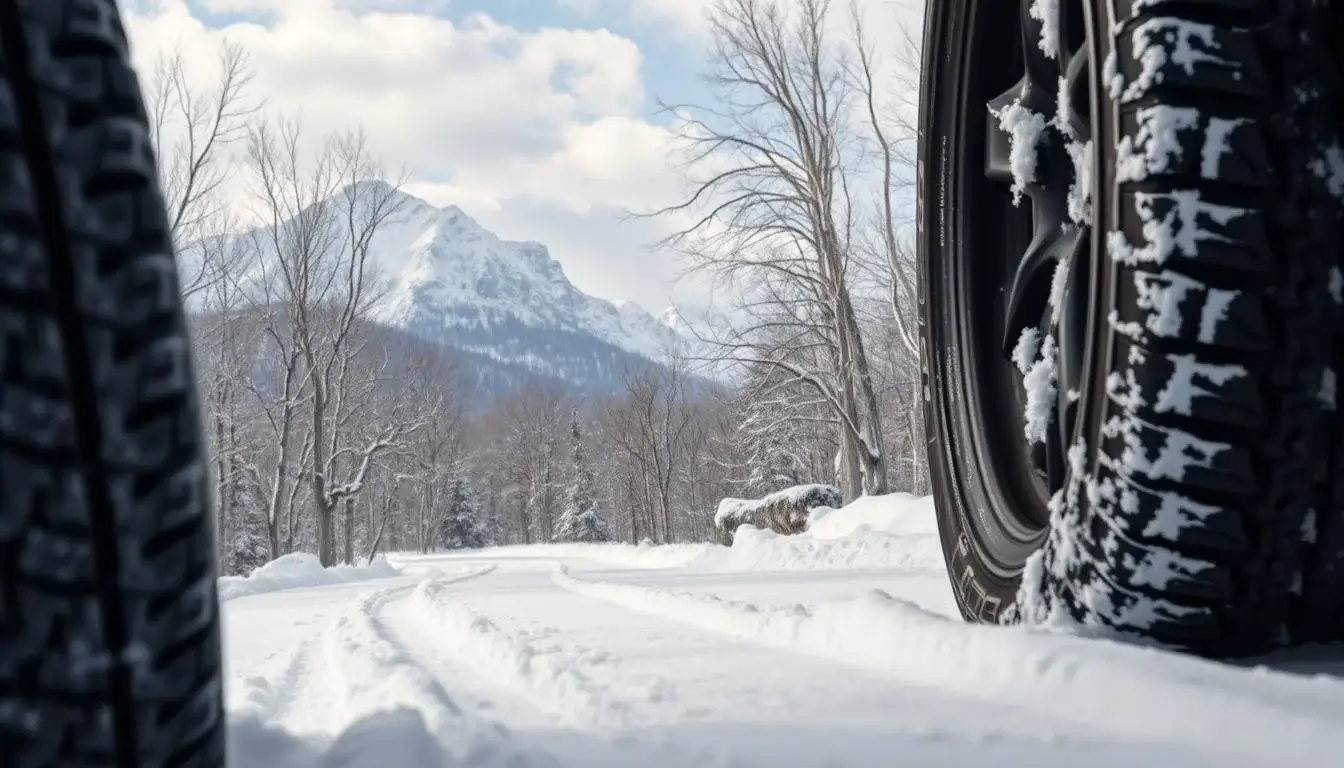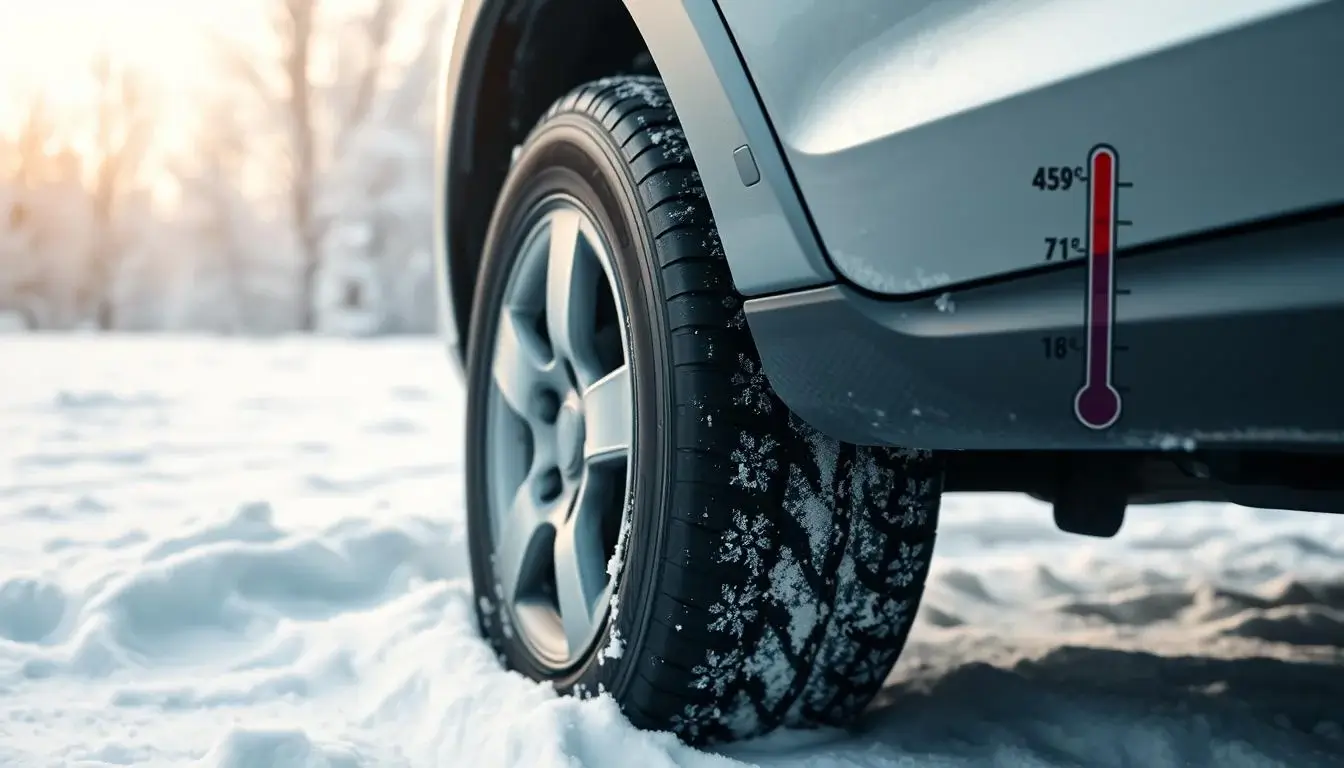Did you know that cars with winter tires crash 35% less in snowy areas? This fact shows why winter tires are key for safe driving. As winter approaches, you might ask: Are Winter Tires Really Necessary? Let’s explore the facts about these tires and when you should use them.
Driving in winter can be very dangerous, even in places with lots of snow. For example, 56 schools in Boise closed early on February 7 because of the snow. This shows how important good tire traction is for icy roads. But are winter tires needed everywhere? And how do they compare to all-season tires?
The choice between winter tires and all-season tires can be confusing. All-season tires are convenient all year, but winter tires are better in cold weather. The U.S. Department of Transportation says winter tires can improve traction by up to 50% on snowy roads compared to all-season tires.
Snow tires aren’t just for extreme weather. They work well in temperatures below 45°F, even on dry roads. This means you might need winter tires even if you don’t live in a snowy area. Knowing when and where to use winter tires can greatly improve your safety on the road.
Key Takeaways
- Winter tires reduce crash rates by 35% in snowy regions
- They improve traction by up to 50% on snow-covered roads
- Winter tires perform better below 45°F, even on dry roads
- Only 12% of American drivers own winter tires
- Vehicles with winter tires are 30% less likely to get stuck in snow
Understanding Winter Tires vs All-Season Tires
Driving in cold weather requires the right tires. Many ask if winter or all season tires are better. Let’s look at what makes each type different.
Special Rubber Compounds and Temperature Performance
Winter tires have a special rubber that stays soft in cold. This softness helps them grip icy roads better and brake faster. All-season tires get hard in the cold, making them less effective.
Tread Pattern Differences
Winter tires are made for snow and slush. Their deep grooves and designs push water and slush away, keeping contact with the road. All-season tires have a more general tread, but they can’t match winter tires in tough conditions.
Grip and Traction Capabilities
Winter tires grip snow and ice better than all-season tires. Their cold-weather performance is key to your safety. Here are some facts:
- Winter tires stop up to 30% faster on ice than all-season tires
- Carrying winter tires lowers accident rates by up to 20% in winter
- About 35% of all-season tires lose their grip below 40°F, affecting snow or ice performance
| Feature | Winter Tires | All-Season Tires |
|---|---|---|
| Rubber Compound | Stays flexible in cold | Hardens in freezing temps |
| Tread Depth | 11-12 mm average | 8-9 mm average |
| Performance Below 45°F | Maintains effectiveness | Reduced effectiveness |
| Snow and Ice Traction | Superior | Limited |
Getting winter tires can greatly improve your safety and driving in harsh winter weather. Remember, your tires are the link between your car and the road, more so in tough conditions.
Are Winter Tires Really Necessary
Winter tires are made for tough winter conditions. They make driving safer and easier. You might wonder if they’re worth it. Let’s explore why they’re important and when to use them.
Safety Benefits in Snow and Ice
Winter tires are perfect for snow and ice. They improve grip and control. This means you stop faster and slide less.
Performance in Temperatures Below 45°F
Winter tires are great even when it’s not snowing. They’re designed for cold weather. Below 45°F, they really stand out. They stay flexible and grip the road better than regular tires.
Common Misconceptions About AWD and 4WD
Many think AWD or 4WD means no need for winter tires. But that’s not right. These systems help you move, but not stop. Winter tires improve traction for all vehicles, including AWD and 4WD.
| Feature | All-Season Tires | Winter Tires |
|---|---|---|
| Cold Weather Performance | Fair | Excellent |
| Snow Traction | Limited | Superior |
| Ice Grip | Poor | Good |
| Stopping Distance (Snow) | Longer | Shorter |
Winter tires are a smart choice for safe winter driving. They work well in snow, ice, and cold temps. Even with AWD, winter tires can make winter roads safer.
🚗 Don’t Wait – Get Your Winter Tires Before It’s Too Late!
By now, you understand the importance of switching to winter tires at the right time. Whether you’re dealing with icy roads, freezing temperatures, or unpredictable winter weather, having the right cold-weather tires is essential for safety and control.
❄️ Be prepared before the first snowfall! Find the best winter tires for your vehicle today and drive with confidence all season long.
🔗 Shop from Amazon Winter Tires Now
Where Winter Tires Are Mandatory and Recommended
Winter tires are not a must in most of the USA. But, they are highly suggested in places with harsh winter weather. Some areas have rules about using winter tires during the cold months.
In New York, winter weather can be very harsh. Forecasts say there will be at least three winter storms by mid-February. One storm might bring 6 inches of snow. This makes having the right tires very important.
Temperatures are expected to fall to the teens and even below zero in some spots. All-season tires might not be enough to keep you safe on slippery roads.
Not having winter tires is not illegal in most states. But, using them can make a big difference in staying safe. In places like Central New York, where snow and ice hit every 3-4 days, winter tires are much better than all-season or summer tires.
| Tire Type | Performance in Winter | Cost-Effectiveness |
|---|---|---|
| Winter Tires | Excellent in snow and ice | High initial cost, but worth it for safety |
| All-Season Tires | Fair in light snow | Lower cost, but less effective in severe winter |
| Summer Tires | Poor in winter conditions | Not suitable for winter use |
Getting a set of winter tires is a good investment, even in New York’s snowiest cities. Winter tires have special rubber and sipes that help you grip the road when it’s cold. They are a smart choice for staying safe on icy roads.
When to Install and Remove Winter Tires
Knowing when to switch to winter tires is key for safe driving in cold weather. Let’s look at the best ways to install and remove winter tires. This way, you’ll get the most out of your investment.
Temperature Guidelines for Installation
Winter tires are needed when temperatures fall below 45°F. At this point, they offer better grip in snow and ice than all-season tires. Watch local weather forecasts to know when to put them on.
Storage and Maintenance Tips
Proper storage helps your winter tires last longer. Keep them in a cool, dry spot, away from sunlight. Clean them before storing and use tire bags if you can. Also, rotate your winter tires to ensure even wear.
Seasonal Timing Considerations
Put on winter tires before the first snow, usually in late fall. Take them off when spring temperatures stay above 45°F. This timing helps your winter tires last longer.
| Tire Type | Average Lifespan | Best For |
|---|---|---|
| Winter Tires | 3-4 seasons | Snow and ice conditions |
| All-Season Tires | 3-5 years | Mild winter conditions |
By following these tips, your vehicles with winter tires will be ready for winter. This ensures safety and peace of mind while driving in the cold.
Ready to Make the Switch? Get Your Winter Tires Today!
You now know when to put on and remove winter tires—but knowing isn’t enough! The right set of winter tires can make all the difference in your safety, handling, and overall driving confidence.
Don’t wait until the roads are covered in snow and ice. Make the switch now and experience better traction, improved braking performance, and superior control in low temperatures.
🚙 Find the perfect winter tires for your car and drive safely this season!
Conclusion
Winter tires are key for your safety in cold months. They’re not just for snow and ice; they’re good for temperatures below 45°F. The top 10 winter tires offer superior grip and traction, making them recommended for winter driving.
While some may wonder if cheap winter tires are good, investing in quality can make a big difference in performance. Cheap tires might save money but may not perform as well.
When comparing winter rated vs winter tires, true winter tires often outperform all-season options in severe conditions. The most popular winter tires balance cost with effectiveness. While there are pros and cons of winter tires, the safety benefits usually outweigh the disadvantages.
For those on a budget, used winter tires can be safe if properly inspected and maintained. This can be a cost-effective option.
Is it safe to drive without winter tires? In many areas, it’s legal but not always advisable. Snow tires are better because they’re designed for cold weather performance. Remember to maintain proper tire pressure, typically between 30-35 psi, for optimal winter performance.
By understanding your local climate and driving needs, you can make an informed decision about whether winter tires are necessary for your vehicle.
🚗 Want to dive deeper into how winter tires work and how to choose the best ones?
Check out our complete guide on winter tire performance and selection:
🔗 Do Winter Tires Make a Difference? How to Choose the Best Ones?
FAQ
Are winter tires really necessary?
Yes, winter tires are designed to provide better traction in the snow, slush, and freezing temperatures. If you live in an area with ice and snow, investing in a dedicated set of winter tires is worth the cost because they help you stay in control when driving on icy roads.
What’s the difference between winter tires and all-season tires?
The differences between all-season and winter or snow tires are significant. Winter tires are specifically designed with a flexible rubber compound that remains soft in colder months, while all-season tires are great in moderate climates but lose grip in freezing temperatures. Snow tires on your vehicle improve performance on packed snow and slush, offering plenty of tread depth for traction.
Do I need a set of winter tires if I have an AWD or 4WD vehicle?
Yes! Even if your vehicle can help with traction through AWD or 4WD, it won’t improve control when driving on ice. AWD helps with acceleration, but winter tires make a real difference in braking and handling. A dedicated set of winter tires is the best way to help keep you safe.
Are winter tires mandatory in the USA?
No, winter tires must be used only in some regions with extreme winter conditions. However, some states or cities soon as the temperature drops may require snow tires on your vehicle during the snow season. Always check local laws or your local Les Schwab to see if winter tires are required in your area.
When should I install my winter tires?
It’s time to make the switch to a dedicated winter setup when temperature drops below 7°C (45°F). Installing winter tires twice a year (before and after winter) ensures your tires stay in the best condition for the rest of the year.
How long do winter tires last?
With proper care, a set of snow tires can last 3-4 seasons. However, tires play a crucial role in safety, so checking tread depth and ensuring they remain flexible in freezing weather is essential. If you notice reduced performance or cracking on the sidewall, it’s time for a replacement set of tires.
Can I use winter tires all year long?
No, using winter tires in the summer is not recommended. Winter tires are designed to be flexible in freezing temperatures but will wear faster in warmer weather. If you want a year-round option, consider all-season and summer tires instead.
Are cheap winter tires worth it?
While affordable tires may seem tempting, investing in winter tires of higher quality ensures better traction in the snow and help you stay in control. High-quality winter tires make a real difference in safety, especially when driving in the snow or on packed snow.
Is it safe to drive without winter tires in snowy conditions?
Driving on icy roads without a dedicated set of winter tires can be dangerous. Without the right set of tires, you risk losing control of your vehicle in ice and snow. If you frequently drive in cold weather, winter tires are worth the investment.
Can I mix winter tires with all-season tires?
No, mixing winter and summer tires or all-season and winter tires is not recommended. Different type of tire compounds and treads will result in a reduction in handling and control when driving. Always use a full set of winter tires for help keep you safe.
Can I install just two winter tires instead of four?
Installing only two winter tires instead of a dedicated set of four is unsafe. Your tires must work together to maintain control of your vehicle. Having mismatched tires can make the vehicle unbalanced, especially when braking or cornering.
How should I store my winter tires when not in use?
When keeping the tires in storage, place them away from direct sunlight in a cool, dry space. Storing tires on separate wheels can make seasonal changes easier. Also, check tire pressure before reinstalling them for the next season.



